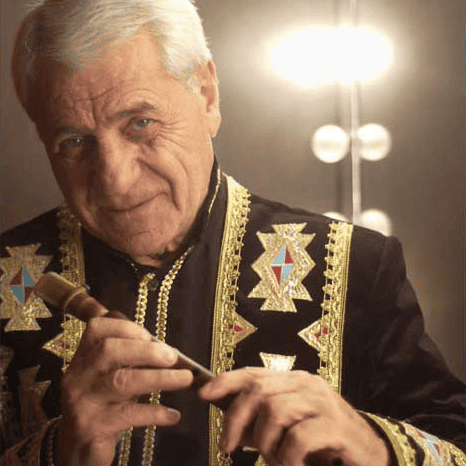He transformed the duduk from a purely folk instrument into a force on the concert stage. Djivan Gasparyan was a celebrated musician who would become a legend on the world scene after he became 60 years old.
Born on October 12, 1928, in Solak, in the province of Kotayk (Armenia), to parents from Moush, Gasparyan started to play duduk when he was six. He lost his mother in 1941 and his father went to World War II, and he grew up in an orphanage. At the age of twenty-օne, he became a soloist of the Armenian Song and Dance Popular Ensemble, later named after Tatoul Altounian, and the Yerevan Philharmonic Orchestra, although he grew up not knowing how to read music.
Gasparyan won four medals at worldwide competitions of UNESCO (1959, 1962, 1973, and 1980) and was awarded the honorary title of People’s Artist of Armenia in 1973. He received the WOMEX (World Music Expo) Lifetime Achievement Award and was an honorary citizen of Yerevan.
He enrolled in 1980, at age 52, at the Yerevan State Conservatory of Music where he later became a professor, instructing and nurturing many performers to professional levels in duduk.
Gasparyan’s international projection, and that of the duduk, started in 1988, when Brian Eno heard him play at a performance in Moscow and invited him to London. Eno introduced the musician to Michael Brook, who produced Gasparyan’s first international album, “Moon Shines at Night.” Eno managed to license another recording, “I Will Not Be Sad in This World,” from Melodiya, the Soviet state label, and issue it outside the Soviet Union. Gasparyan’s production would include some twenty albums and ten collaborations as guest artist with David Sylvian, Andreas Vollenweider, Ludovico Einaudi, Jesse Cook, Michael Brook, and others.
Also in 1988, most international audiences first became acquainted with Gasparyan’s music via the soundtrack to Martin Scorsese’s film “The Last Temptation of Christ,” which was curated by Peter Gabriel. His music later appeared in other soundtracks, such as Atom Egoyan’s “Calendar” (1993), “The Crow” (1994), “Dead Man Walking” (1995), “The Siege” (1998), “Ronin” (1998), Ridley Scott’s “Gladiator” (2000), which won an Oscar for best original score, “Syriana” (2005), “Blood Diamond” (2006), and “Samsara” (2011).
He formed a unique duduk quartet and released an album in 1998. He attested in the liner notes that “there is no other like it in the world” and that creating arrangements for four musicians with “new duduk tones, alto and bass, was an extremely difficult task.”
He toured the world several times with a small ensemble playing Armenian folk music. He collaborated with many artists of world renown, such as Sting, Peter Gabriel, Brian Eno, Brian May, Lionel Richie, Annie Lennox, and others. He also recorded with the Kronos Quartet and the Los Angeles Philharmonic.
In 2006 he was nominated for the Grammy Awards for the Best Traditional World Music Album. He played as part of Eva Rivas’ entry for Armenia, “Apricot Stone,” at the 2010 Eurovision Song Contest in Oslo (Norway), becoming the oldest ever person to feature in a Eurovision performance, but was not officially listed as a guest artist.
He passed away on July 6, 2021. On his death, Peter Gabriel called Gasparyan “the great master of the instrument” and added: “When he lifted his duduk to his lips, he cast a spell over all who listened.”

